On 16 May 2013, The Calvinist International posted an article by Pastor Steven Wedgeworth: “Alexander Schmemann on Ecclesiastical Counter-Utopia.” It is a curious article; apart from the one opening sentence by Pastor Wedgeworth, the rest of the blog posting consists of selections from a speech given by Fr. Alexander Schmemann in 1981 titled: “Between Utopia and Escape.” I could be mistaken but it seems that the point Pastor Wedgeworth wants to convey via Father Schmemann is the warning that some people convert to Orthodoxy out a desire to “escape from the system” and “become weird.” (As if the Reformed tradition doesn’t have its own representative “weirdos”! 🙂 )
Fr. Schmemann recounts,
And again, I am very well placed to know that, because, unfortunately, my religion, Eastern Orthodoxy, is very often identified as a provider of those kind of little mystical techniques which will satisfy the dropout’s heart for personal bliss out of The System. (Emphasis added.)
Today, at Penn Station, a man whom I knew many years ago, approached me and said, “Hello, Father Schmemann.” And I said, “Who are you?” because he was dressed in a kind of black robe and was nearly stepping on his beard. Everything about him was peculiar, from his hair, to his strange hat… He was probably playing a monk from Mt. Athos or something of that nature, but I knew he was born in Brooklyn. I know many converts to Orthodoxy who think that when they become Orthodox, they have to also become Russian monarchists, and think that the restoration of the Romanovs in Russia is the only condition for the world’s salvation. (Emphasis added.)
Pastor Wedgeworth is attempting a bit of apologetics jiujutsu, utilizing the opponent’s force against him. Father Schmemann enjoys the unusual status of being one of the Orthodox writers influential among Reformed Christians who want to deepen their spiritual roots by exploring the Liturgy and the early Church. “Unfortunately,” Father Schmemann’s writings have often become the “gateway drug”—something much denied by his Protestant followers–leading Protestants to convert to Orthodoxy. Apparently, Pastor Wedgeworth is attempting to stem the flow of converts by invoking the “great” Alexander Schmemann who warned against converting to Orthodoxy: “It’s escapist. People who convert do so for shallow, immature reasons.” The hidden subtext here seems to be: “You don’t have to go all the way and become weird. You can take the more mature route of staying Protestant.” That is, being ½ Orthodox and ½ Protestant. Or is it being ¼ Orthodox, ¼ Anglican, ¼ Roman Catholic, and ¼ Reformed? 😉
It’s Not 1981 Anymore!
When Father Schmemann gave the talk “Between Utopia and Escape” in 1981, the United States of America was a very different country. Ronald Reagan had just begun his presidency. Back then, Protestantism was thriving and growing. One could say that the 1970s and 1980s were the springtime of Evangelicalism. Back then, Orthodoxy consisted mostly of small ethnic enclaves. People drawn to Orthodoxy back then were often discouraged on the grounds that converting to Orthodoxy also entailed assuming the ethnic identity of that parish.
But in 1987 something happened that changed Orthodoxy in America. Some two thousand former Evangelicals were welcomed into the Orthodox Church. This bold action was taken by Metropolitan Philip, the Primate of the Antiochian Orthodox Church in America, with the approval of Patriarch Ignatius IV. The people they welcomed were not fringe weirdos, but had roots in the Evangelical mainstream. Many had been part of the leadership of the huge parachurch organization, Campus Crusade for Christ. Many had studied at Evangelical institutions like Wheaton College, Moody Bible Institute, Dallas Theological Seminary etc. Their journey to Orthodoxy has been described by the late Father Peter Gillquist in Becoming Orthodox. See also Peter Gillquist’s Coming Home: Why Protestant Clergy are Becoming Orthodox.
The reception of the Evangelical Orthodox brought about a change in thinking. Many began to think that it was possible for one to convert to Orthodoxy without undergoing a change in ethnicity. This change in thinking was facilitated by the Antiochian archdiocese’s commitment to evangelism and church planting. This desire to reach out to the American mainstream was also shared by the Orthodox Church in America (the jurisdiction that Father Schmemann was part of). Far from discouraging them, Father Schmemann encouraged them in their journey to Orthodoxy. Peter Gillquist credits him with their becoming Orthodox (pp. 130-131). This effectively refutes the point Pastor Wedgeworth tried to make in citing Father Schmemann.
Is Fleeing the Titanic Escapist?
Protestantism and Evangelicalism also underwent considerable changes since Alexander Schmemann issued his warning in 1981. The 1980s was the peak of the evangelical renewal movements among the mainline denominations. However, they were largely unsuccessful in reversing the trend towards avant garde doctrines and deviant sexual practices. In addition, Protestant ecclesiology was turned on its head with the emergence of the mega churches, and Protestant worship became nearly unrecognizable under the onslaught of contemporary worship. Conservative seminaries became fierce battlegrounds with disputes over evolution, inerrancy, the New Perspectives on Paul, critical hermeneutics, and patristics intruding on longstanding denominational distinctives that demarcated the interior boundaries of Evangelicalism. Among these various movements there emerged the neo-Reformed movement which sought to reintroduce the rigor of the Reformed faith and Puritanism to popular Evangelicalism. One of the irony of the neo-Reformed movement is that the Puritans who came to the New World were “weirdos” (Nonconformists) and “escapists” (who fled after failing to reform England). Father Schmemann’s criticism cuts in both directions so one should beware of quoting him freely.
In many respects the growing stream of converts to Orthodoxy point to the interior collapse of Evangelicalism and Protestantism. These are folks deeply committed to Jesus Christ as their Lord and Savior. They are deeply distressed by the growing doctrinal disarray within Protestantism and are drawn to the historic faith of Orthodoxy. They are also drawn to the stability and dignity of liturgical worship. Many have been hesitant to convert to Orthodoxy because they know that it entails a break with their Protestant past and could cause pain for their loved ones. It would be unfair to folks like these to insinuate that they want to “become weird” or that psychological factors prompted their conversion to Orthodoxy.
For many it was their devotion to the Bible as God’s inspired word that led them out of Protestantism into Orthodoxy. In their study of Scripture many have had to wrestle with the Apostle Paul’s letter to the Thessalonians which seems to teach not sola scriptura, but Holy Tradition:
So then brothers, stand firm and hold to the traditions we passed on to you, whether by word of mouth or by letter. (II Thessalonians 2:15).
Here Paul does not assign a superior status to his writings—which is what one would expect if Paul held to sola scriptura—but views oral and written tradition as having equal authority. Furthermore, Paul’s teachings in II Timothy lend credence to apostolic succession.
What you heard from me, keep as the pattern of sound teaching, with faith and love in Christ Jesus. Guard the good deposit that was entrusted to you—guard it with the help of the Holy Spirit who lives in us. (II Timothy 1:13-14)
The phrase “what you heard” is a reference to oral tradition. When he wrote II Timothy towards the end of his life, the Apostle Paul could have instructed Timothy to collect and compile all his writings. This would support the Protestant principle of sola scriptura, but instead we find Paul instructing Timothy to commit to memory the oral tradition and to pass on this tradition to others. This traditioning process opens the door to the early Church. Evangelicals who then studied the early church found themselves face to face with an early Christianity committed to the Apostles’ teachings and to Orthodoxy which has kept the Apostolic Tradition for the past two millennia.
My journey to Orthodoxy was a lot like fleeing the Titanic. Having been a member of the mainline United Church of Christ (UCC) which has roots going back to Puritan New England I was in a good position to see the boat listing and taking on water. The UCC had the reputation for being on the cutting edge of liberal theology. As a church history major at Gordon-Conwell Theological Seminary I was able to study historical theology. My research led me to conclude that much of Protestantism’s woes can be traced to the doctrine of sola scriptura. I was fortunate to have learned about Orthodoxy and met former Evangelicals like Peter Gillquist. Knowing that one could convert to Orthodoxy without relinquishing one’s cultural identity made it much easier for me. As I stood on the railing of the sinking “Titanic,” I saw myself faced with the two options: (1) the two thousand years old Ark of Salvation (Orthodoxy) or (2) the myriad of small lifeboats from the “Titanic” (the splinter denominations). I chose The Orthodox Ark. It had been around for the past 2,000 years. The antiquity and stability of the Ark of Orthodoxy stands in sharp contrast to the many tiny Protestant life boats made from bits and pieces of the sinking “Titanic.”
Many who convert to Orthodoxy do so out of the conviction that what the Orthodox Church teaches is consistent with Scripture and with the teachings of the early church fathers. Peoples’ move to Orthodoxy has also been facilitated by the experience of the holy in the Liturgy. Orthodoxy in America is going through a period of transition. It is moving out of its ethnic ghettoes into the mainstream of American society. All English liturgies are becoming more common. As more and more Protestants and even Roman Catholics enter into Orthodoxy, it is going to be harder to use being weird or escapist as reasons for converting to Orthodoxy.
Robert Arakaki
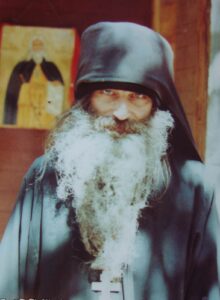
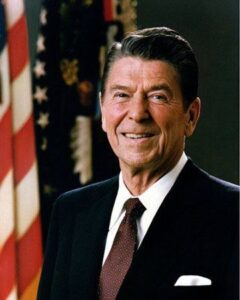
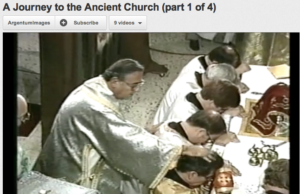

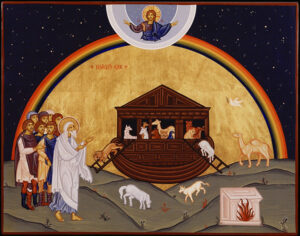
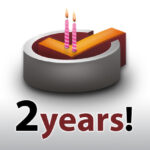
Thanks, Robert. It is crazy to think how hard it is for Protestants to explore Orthodoxy. There can be stumbling blocks from both sides. But as one who sees major problems with Protestant assumptions, I can see how many have concluded that Orthodoxy is more Biblical. It is certainly not escapist – unless what you mean is that it provides stability. I am not yet ready to leave the “titanic” but thank you and all the others for helping me understand the “ark” better. 🙂
Prometheus,
I just wanted to say how much I appreciate your contribution to the OrthodoxBridge. Your tough questions have come with a spirit of charity and openness. Let’s keep the conversation going!
Robert
Guilty as charged. I am one of the weirdos.
I converted to Orthodoxy in 1984 (or at least to the EOC version of it), having been an elder in the PCA prior to that. I was chrismated and then ordained a deacon by his imminence, Metropolitan Philip, in 1987.
Interestingly, I continue to work in the evangelical publishing world, eventually becoming the Chairman and CEO of Thomas Nelson Publishers. Over the years, I have had numerous conversations with prominent evangelical leaders about Orthodoxy. This was almost always at their initiative. They seemed very curious and respectful.
Fr. Alexander was my “gateway drug” to be sure. As a Presbyterian, I read For the Life of the World. It was all downhill from there.
Thanks for this post.
Michael,
Welcome to the OrthodoxBridge! I want to let you know how much I appreciate your excellent work. I’m glad to hear that Evangelicals have approached you interested in learning more about Orthodoxy. Let us continue to work to bring America to Orthodoxy!
Robert
Dn Michael,
Let me say I have enjoyed listening very much to most all your SS lesson at Ancient Faith Radio the past three years. As you might remember being Reformed (33+ yrs for me) I had to smile at Pastor Wedgeworth’s weirdness comment! 🙂 We Reformed folk have more than our share of weird folk, but given your professional pedigree, I’m not sure you still qualify. Perhaps?Anyway, thank again for the measured, even understated kindness of your SS podcast. They have been most helpful for my understanding of Orthodoxy.
david
https://www.ancientfaith.com/podcasts/eastwest (w/deacon Michael Hyatt)
My, Wedgeworth is certainly popular around the Orthodox blogsites. Thanks for the response Robert. Always good to know that there are a few folks handling these articles and their authors from multiple angles.
John
To characterize my conversion to Orthodoxy as “escapist” is profoundly off the mark (and would be insulting if it came from someone who knew me and my situation well). I have never undertaken a spiritual ordeal more taxing than my conversion to Orthodoxy. It has also been infinitely more rewarding than any other spiritual endeavor I have attempted. This Orthodox boat floats, for sure! Or, to use another author’s analogy, no more running from one well than eventually runs dry to another, attempting to slake my spiritual thirst for Christ, finding bits and pieces of the fullness of Orthodoxy in other Christian traditions mixed in with distortions and error. I have finally found myself at the very wellspring that feeds all those wells where the wholeness of the full apostolic Christian tradition is intact. I’m home, and I’m not going anywhere else ever again, except by the help of God’s grace, ever deeper into the heart of my Lord God and Savior, Jesus Christ.
Robert,
I rejoice in the rise of Orthodoxy in America. Do you have any idea on when English liturgy, will be modern English rather than circa King James? This would be a huge push forward.
Michael,
Welcome to the OrthodoxBridge!
Your question about the kind of English to be used is a good one. Some people believe that we ought to stick to Elizabethan English as a way of maintaining traditional Christianity but that can result in trapping the Faith into a particular cultural container. The main thing is that this is 21st century and not 17th century England. The Christian Faith is for all people, for all time until Christ returns in glory. We need to make sure that we communicate the Good News so that people can understand it. That is the spirit of Orthodox missions.
We need people like you to speak up for reaching out. Don’t be shy in letting your priest or others in your parish know what you think.
Robert
Michael, I actually love that style of English! Why change it?
Me too. Much better than awkward reworkings in modern English. Like saying “people” instead of “mankind.”
Amen Gabe/jnorm! Prof. Clark Carlton, and Orthodox convert from So-Bapt. argue convincingly that the Orthodox Church should target a High-English with a nobility that will shape the Orthodox English-speaking culture. Giving the devolving crudity of modern ‘street-English’…including the silliness of the old ’60 bibles in the cool hippy language of the day, I’m also with him all the way. (Oophs…can find the podcast where he “Commends!!” this book as an example of the high English to shoot for [i’ll keep looking]:
http://www.amazon.com/Psalter-Prayer-Adaptation-Translation-Instructional/dp/0884651886/ref=wl_it_dp_o_pd_nS_nC?ie=UTF8&colid=1E08T2QIBPY56&coliid=I3SBBI23Y5M286
…but the ones below are ‘related’, are excellent, and only 11-minutes long…(reminds me how much substance can be said in 11 mins…IF the speaker is thoughtfully prepared)! enjoy
http://www.ancientfaith.com/podcasts/carlton/art_and_the_formation_of_orthodox_culture
http://www.ancientfaith.com/podcasts/carlton/some_thoughts_on_american_orthodoxy
Wow! Escapist, huh? This has to go into the category of “what will they come up with next”. My conversion to Orthodoxy was costly not escapist. It cost me a
future ministry in my denomination, the respect of many of my peers whom I still love and criticism from friends and family. I “escaped” security, respect and financial stability all to pursue a treasure hidden in a field. BTW, I’m so glad I did!
May the Lord bless you, Chris. Your story is far more common, and many ignore the other side of the conversion “coin,” so to speak.
On the other hand, how many people are intrigued or even drawn to Orthodoxy, and yet never convert, due to the great cost? Losing jobs, wasted Seminary degrees, being disowned by family, etc. Some brave souls are willing to take those risks, but many more are not.
Either way, casting stones on such matters is best left for the Lord alone to judge.
Amusingly enough I was a monarchist long before I converted to Orthodoxy. My conversion, like most others I suspect, was a result of reading deeply into the history of the Faith and finding that most of what I had been taught was either a novelty, something that bordered on outright heresy, or both.
Peter,
Thank you for your input. Interesting!
Robert
I just wanted the Sacraments(Mysteries) to be honest! That’s the main reason why I converted. In fact, back when I was protestant I had an extremely hard time partaking in most protestant churches. At that time My conscience felt more comfortable with the Episcopalians (especially the Anglo-catholics). And so my conversion to Orthodoxy was more Eucharist centered than anything else. And so is that really escapism?
My journey to Orthodoxy (being christmated this coming September!) was not one of escape, but, rather, the fulfillment of everything I had been seeking since becoming a Christian 11 years ago. After being encouraged by a Mennonite friend, strangely, to visit an Orthodox church, I reluctantly went to a vespers service. I’ll say, it was the first time in all my time on a “journey with Christ,” that I actually felt like I had reached my destination. I may not be “at home” in this world, but I am at home with the Orthodox Church.
Clifford,
Thanks for sharing with us your journey to Orthodoxy. God bless!
Robert
This was a good article except for one thing. The conversions to Orthodoxy began long before Metropolitan Philip had the courage to receive the Evangelical Orthodox. Convert priests were already close to a majority of the clergy of the Antiochian Archdiocese long before the EOC came into the Church. There were many who prepared the way for the mass conversions, going all the way back to the 1920s.
Dear Fr. John,
I don’t disagree with what you wrote, but is it not the case that the reception of the Evangelical Orthodox in 1987 changed the way people looked at Orthodoxy in America? I know it did for me.
Robert
I came across the following quote today and remembered this post, so I thought I would add it here, to balance the out of context quotes from Fr. Alexander that Pastor Wedgeworth pulls out:
wonderful quote Carson…thank you.
Great discussion! I like your point over all. It is a complex matrix–conversion. I think there is more than mere escapism occurring, though I think there are some converts who have done just that and again, as you wrote, even that isn’t inherently wrong. Is it wrong to escape the Titanic, as you ask?
You and others might be interested in my book, coming out from Oxford University Press this fall (slated for November) entitled Turning to Tradition. It focuses on exemplary American Orthodox converts.
Thank you Fr. Oliver! I’m glad you liked the conversation. I will definitely be on the look out for your book.
Robert
Fr. Oliver…please do let us know when it is released! Very interested and encouraged by the faith and courage of other converts.
Ok, it’s out now:
http://www.amazon.com/Turning-Tradition-Converts-American-Orthodox/dp/0199324956/ref=sr_1_1?ie=UTF8&qid=1384918418&sr=8-1&keywords=Turning+to+Tradition